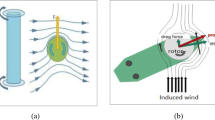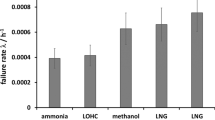Abstract
Bulkers are vessels that carry various types of cargo, which includes coal, iron ore or grain ranging from 3000 deadweight tonne (dwt) to 400,000 dwt. These bulkers are propelled by large marine diesel engines the capacity of which ranges from 4000 kW to 80,000 kW. The owners of the bulkers generally charter the vessels to reputed charter parties for mutually agreed terms and condition, the main specifications being the vessel speed in knots and the fuel consumption in tonnes per day respectively. Safe transportation of the bulk cargo from one port to another at the specs of the charter party is a great challenge for the vessel’s chief engineer. Moreover, there is a likelihood of the vessel coming to a halt in a harsh weather condition, because of the main engine failure. Thus, the seafarer’s on-board ship needs to be well prepared to handle such an emergency in a harsh working environment. This study looks at the likelihood of main engine failure during harsh weather at sea and effective ways of managing the emergency. The findings of this study will work as a guide for the seafarers and helps to manage the risk on-board ship.











Similar content being viewed by others
References
Anantharaman M, Khan F, Garaniya V, Lewarn B (2017) A holistic approach to reliability and safety on the operation of a main propulsion engine subjected to a harsh working environment, 3rd Workshop and Symposium on Safety and Integrity Management of Operations in Harsh Environments (C-RISE), 18-20 October, St John's, NL, Canada: 1–6
Anantharaman M, Khan F, Garaniya V, Lewarn B (2018a) Reliability assessment of main engine subsystems considering turbocharger failure as a case study, TransNav: International Journal on Marine Navigation and Safety of Sea Transportation 12
Anantharaman M, Khan F, Garaniya V, Lewarn B (2018b) Reliability assessment of main engine subsystems considering turbocharger failure as a case study. TransNav: Int J Marine Nav Saf Sea Transport 12:271–276
ATSB (2012) Steering gear breakdown on board the New Zealand registered tug Tuahine off Queensland 31 October 2011, Australian Transport Safety Bureau, Australia: 1–3
ATSB (2018) Grounding of the bulk carrier Bulk India during departure from Dampier, WA, on 11 March 2018, Australian Transport Safety Bureau, Australia: 1-2
Balin A, Demirel H, Alarcin F (2016a) An evaluation approach for eliminating the failure effect in gas turbine using fuzzy multiple criteria. Trans Royal Instit Naval Architects 158(Part A):219–230
Balin A, Demirel H, Alarcin F (2016b) A novel hybrid MCDM model based on fuzzy AHP and fuzzy TOPSIS for the most affected gas turbine component selection by the failures. J Marine Eng Technol 15(2):69–78
Balin A, Demirel H, Celik E, Alarcin F (2018) A fuzzy DEMATEL model proposal for the cause and effect of the fault occurring in the auxiliary systems of the ship’s main engine. Int J Marit Eng 160:A141–A153
Cepowski T (2017) Prediction of the main engine power of a new container ship at the preliminary design stage. Manag Syst Prod Eng 25:97–99
Demirel H, Ünlügençoglu K, Alarcin F, Balin A (2015) Application of fuzzy analytic hierarchy proses for error detection of auxilary systems of ship main diesel engines. Trans R Inst Nav Archit Int J Marit Eng 157:A105–A111
Hatzigrigoris S, Dritsas C, Heliotis A, Spertos A, Morfinos C, Kriezis G (2006) Day-to-day challenges of a ship** company from the technical department's point of view: lessons learned. Marine Technol 43:185–202
Houvardas D (2017) Charterers and vetting: balancing between freedom and nightmare. J. Mar. L. & Com. 48:183
Islam R, Yu H (2018) Human factors in marine and offshore systems. In: Khan RAF (ed) Methods in chemical process safety. Academic Press, United Kingdom, pp 145–167
Islam R, Abbassi R, Garaniya V, Khan FI (2016a) Determination of human error probabilities for the maintenance operations of marine engines. J Ship Prod Design 32:226–234
Islam R, Yu H, Abbassi R, Garaniya V, Khan F (2016b) Development of a monograph for human error likelihood assessment in marine operations. Saf Sci 91:33–39
Islam R, Abbassi R, Garaniya V, Khan F (2017) Development of a human reliability assessment technique for the maintenance procedures of marine and offshore operations. J Loss Prevent Process Indust 50:416–428
Islam R, Khan F, Abbassi R, Garaniya V (2018a) Human error assessment during maintenance operations of marine systems–What are the effective environmental factors? Saf Sci 107:85–98
Islam R, Khan F, Abbassi R, Garaniya V (2018b) Human error probability assessment during maintenance activities of marine systems. Saf Health Work 9:42–52
Islam R, Anantharaman M, Khan F, Garaniya V (2019) Reliability assessment of a main propulsion engine fuel oil system-what are the failure-prone components? TransNav Int J Marine Nav Saf Sea Transport 13:415–420
Malik Z, Briddon M (2011) Integrated condition monitoring in the maritime sector, 8th International Conference on Condition Monitoring and Machinery Failure Prevention Technologies, June 20-22. Cardiff, United kingdom: 867-877
Martinović D, Tudor M, Bernečić D (2011) An Analysis of Starting Points for Setting Up a Model of a More Reliable Ship Propulsion. Brodogradnja: Teorija i praksa brodogradnje i pomorske tehnike 62:249–258
Nunes T (2003) Charterer's liabilities under the ship time charter, Houston. J Int Law 26:561
Pundars C (2018) Future Business Potential Map** for Wärtsilä Marine Solutions, .
Sadatomi M, Ito H (2016) A study of reliability evaluation of main bearings for multicylinder diesel engines. SAE Int J Fuels Lubric 9:41–47
Song X, Wang C, Ma Q (2012) Analysis of management factors of main engine failure based on event tree analysis, 2012 7th International Conference on System of Systems Engineering (SoSE)
Torims T, Vilcans J, Zarins M, Ratkus A (2012) Development of the in-situ laser renovation technology for marine diesel engine crankshafts. Annals of DAAAM for 2012 & Proceedings of the 23rd International DAAAM Symposium: 2304-1382
Weintrit A, Neumann T (2015) Safety of Marine Transport: Marine Navigation and Safety of Sea Transportation, CRC Press
Acknowledgements
The authors thank National Centre for Ports and Ship** at the Australian Maritime College of the University of Tasmania for the conference support.
Author information
Authors and Affiliations
Corresponding author
Rights and permissions
About this article
Cite this article
Anantharaman, M., Islam, R., Khan, F. et al. Emergency preparedness for management of main propulsion engine failure on a bulker during harsh weather at sea. Saf. Extreme Environ. 2, 103–111 (2020). https://doi.org/10.1007/s42797-019-00014-5
Received:
Revised:
Accepted:
Published:
Issue Date:
DOI: https://doi.org/10.1007/s42797-019-00014-5




